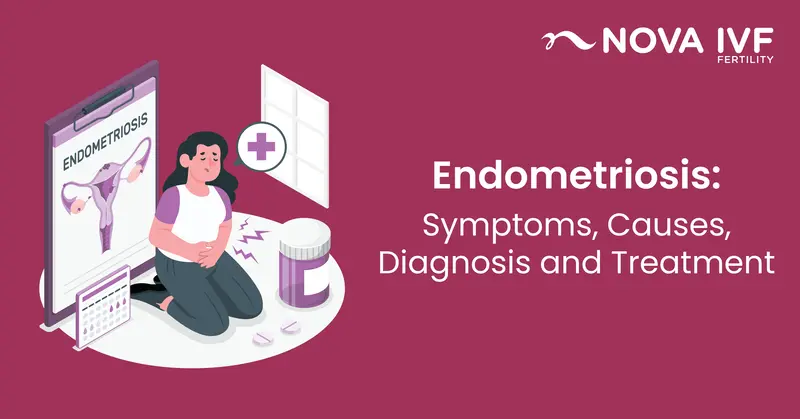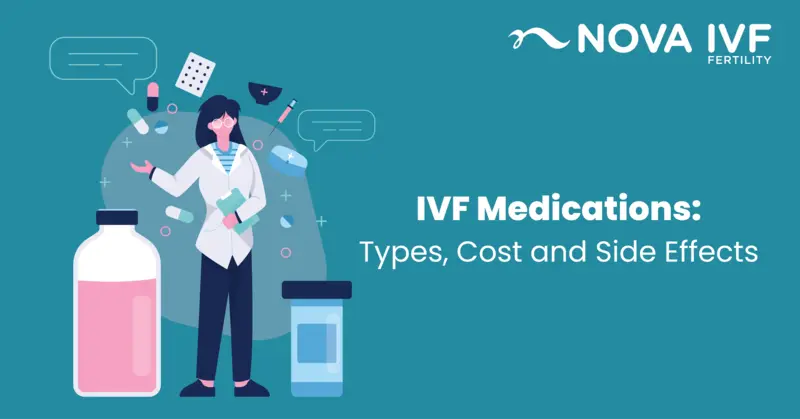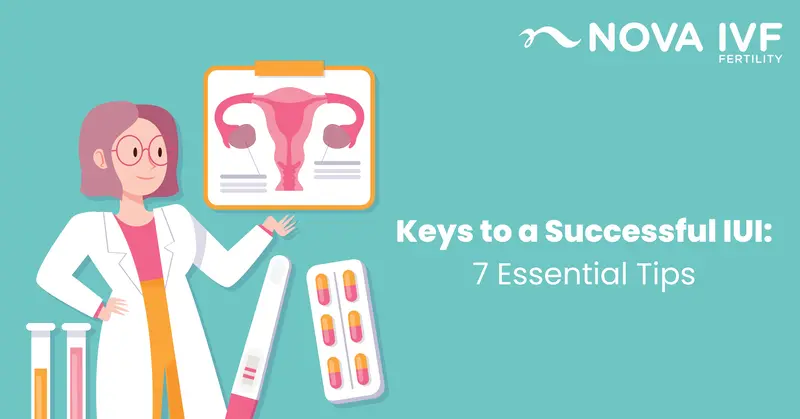Endometriosis

Endometriosis is a mystery to the medical world as the causes of this disorder are unknown. And a lot of women silently or explicitly suffer from this disorder. Did you know that about 10% of the global female population of reproductive age has endometriosis, and it often goes unnoticed.
This disorder targets fertile women in the reproductive age group and causes various complications ranging from chronic pelvic pain to infertility, depending on its severity. This painful disorder can affect the ovaries, fallopian tubes, bladder, bowels, and other tissue in the pelvic cavity. It is very rarely seen to affect organs outside the pelvic cavity.
Endometriosis Overview
Endometriosis, derived from the term endometrium (tissue that lines the uterus), is a common disorder found in women, where the endometrial tissues grow outside the uterus. This gynaecological condition can occur in the ovaries, fallopian tubes, the tissues lining the pelvis, and in rare cases, abdominal cavity, too.
In a normal woman's body, endometrial tissues thicken, shed, and bleed each month during the menstrual cycle, and this cycle repeats until the woman gets pregnant. The displaced endometrial tissues that grow in other parts apart from the uterine walls also follow the same pattern. And due to non-availability of a passage for the shed tissues to exit the body, they are trapped which causes irritation in the surrounding tissues and creates scars or adhesions (tissue strands that cause the pelvic organs to stick to each other) on them. Endometriosis occurring in the ovaries leads to cyst formation.
Women who have endometriosis can breathe a sigh of relief after menopause. Since the levels of oestrogen in the body decrease dramatically after menopause, endometriosis lesions often decrease. This translates to the endometriosis symptoms disappearing or becoming less intense after endometriosis.
Common Places Where Endometriosis Occurs
These are the common areas in a woman's body that can be affected by endometriosis:
- Ligaments supporting the uterus
- Anterior and posterior cul-de-sac (space between uterus and bladder)
- Ovaries
- Fallopian tubes
- The inner lining of the pelvis
- Rectum
- Vagina
- Cervix
- Vulva
- Intestines
- Bladder
- Surgical scars in the abdomen
Endometriosis Stages
There are four stages of endometriosis:
- Minimal Stage: This endometriosis stage is identified by a few minimal superficial implants. Endometriosis symptoms at this stage are almost negligible.
- Mild Stage: In this endometriosis stage, the implants are higher in number and deeper similar to small, flat flecks or patches formed on the pelvis area. These implants cause inflammation or irritation to the surrounding tissues, causing adhesions later.
- Moderate Stage: Chocolate cysts (where the blood inside them turns dark red or brown) appear in the adhesions, which when burst, causes severe abdominal pain and inflammation of the pelvic area.
- Severe Stage: The drastic spread of cysts and adhesions lead to constipation, nausea, abdominal pain, painful bowel movements, and infertility. Surgery is required to remove the cysts.
Endometriosis Causes
Although numerous symptoms of endometriosis are known, exact causes are still unknown. Researchers blame oestrogen for the aggressive spread of endometriosis in a woman's body. At best, doctors can control the production of oestrogen in women to relieve them of the symptoms of endometriosis as there is no treatment available that can cure this disorder completely.
Plausible causes of endometriosis in a woman include the following:
- Retrograde Menstruation : In this condition, the menstrual blood with endometrial cell flows back into the pelvic cavity through the fallopian tubes, instead of exiting the body via the vagina. The displaced endometrial cells enter the pelvic cavity and get stuck to the pelvic wall, surrounding other pelvic organs in the course. These cells continue to grow, thicken, and shed themselves via bleeding in this area during each menstrual cycle.
- Transformation of Peritoneal Cells to Endometrial Cells : According to the induction theory, experts explain that due to hormonal or immune factors the peritoneal cells (that is, the cell lining the interior of the abdomen) are transformed into endometrial cells, and thus they display the characteristics of these cells.
- Transformation of Embryonic Cells to Endometrial Cells : Sometimes, oestrogen transforms the embryonic cells (those cells that are in the early stage of development) into implants of endometrial cells during puberty.
- Previous Surgery : After surgeries, such as a C-section or hysterectomy, there are high chances of endometrial cells to attach to the surgical incisions and grow in these areas. This is also one of the main causes of endometriosis.
- Vascular and Lymphatic Transport : Fragments of endometrial tissues may be transported via the lymphatic system or blood vessels to other parts of the body. The endometrial cells then attach themselves to other organs and start growing there.
- Genetic Reasons: Researchers propose that immediate relatives of the women affected by endometriosis are more likely to suffer from this disorder. Thus, endometriosis occurs in women due to the above-mentioned reasons. Infertility and ovarian cancer are some complications caused by endometriosis.
Endometriosis Symptoms
Before understanding the symptoms of endometriosis, let us take a look at the risk factors involved in this disorder. Endometriosis occurs in a woman several years after menarche or puberty (onset of menstruation). The symptoms of endometriosis end temporarily during pregnancy and permanently after menopause, except when a woman is taking oestrogen.
Common symptoms of endometriosis include the following:
- Pelvic Pain: Women experience such severe cramps in the pelvic area that even over the counter pain relief medications prove inefficient.
- Abnormal Bleeding: Women may bleed excessively during their menstrual cycle or find spotting in between periods. They may also bleed after sexual intercourse or find blood in their stools.
- Infertility: Another common symptom of endometriosis is infertility or the inability to conceive. About 40% of infertile women get diagnosed with endometriosis.
This displaced endometrium tissue behaves in the same way as endometrium tissue inside the uterus. If a woman is not pregnant, the tissue breaks down in each menstrual cycle. Endometrium tissue inside the uterus is released in the form of a period but there is no way for the displaced endometrium tissue to be removed. This irritates the surrounding tissue and may result in the development of scar tissue and adhesions. If left untreated, endometriosis could cause infertility.
Often, endometriosis goes unnoticed or undiagnosed in women until they experience difficulties conceiving or suffer from other health-related issues. Having endometriosis makes it difficult for a woman to get pregnant; however, it does not imply that she cannot bear children. The severity of endometriosis determines how difficult it will be for a woman to conceive. Through surgery or assisted reproductive methods, women suffering from moderate to severe endometriosis can get pregnant. - Painful Urination: Women may experience pain during urination, as the increased water retention leads to pain and pressure in the bladder. They also experience frequent infections in the bladder and have an urge to urinate frequently.
- Painful Intercourse: If endometrial cells grow behind the vagina or in the lower parts of the uterus, women experience immense pain after sexual intercourse. The nerves and ligaments of the uterus are affected causing pain when the endometrial tissues are agitated due to movement during sex. The pain may or may not subside after the intercourse.
- Issues in the Digestive System: In the case of severe endometriosis, women experience constipation, gastritis, nausea, and vomiting since the endometrial tissues affect the intestinal wall.
- Low Immunity: Women become susceptible to bladder infections, common cold, allergies, etc.
Endometriosis displays a large number of symptoms. Some women may undergo chronic pain, while others do not even realise suffering from this disorder until it is diagnosed by doctors while treating other issues.
Endometriosis Diagnosis
Since endometriosis symptoms in the beginning are often written off as usual symptoms associated with periods, it becomes difficult to diagnose the condition early on. If you consult with your doctor about symptoms similar to endometriosis, they will begin by carefully taking a history of your menstrual symptoms and identifying any chronic pelvic pain. These usually provide the basis for suspecting endometriosis. However, for endometriosis diagnosis, the doctor will news to perform several screening tests.
Since endometriosis symptoms can often mimic other conditions, it can lead to a delay in diagnosis. Some of the tests that may be recommended to diagnose endometriosis include the following:
- Magnetic resonance imaging (MRI)
- Ultrasound
- Laparoscopy
Endometriosis Treatment Options
The similarity between the lesions caused in endometriosis and the endometrium makes it difficult to develop a new drug therapy to treat the condition. However, endometriosis symptoms can be treated with medication or surgery. The ideal approach depends on the severity of the condition and if the The similarity between the lesions caused in endometriosis and the endometrium makes it difficult to develop a new drug therapy to treat the condition. However, endometriosis symptoms can be treated with medication or surgery. The ideal approach depends on the severity of the condition and if the woman wants to plan a pregnancy in the future. Surgery is usually advised only if medication does not help. Here are some of the common treatment options for endometriosis:
- Pain Relievers:Dealing with the pain is one of the first steps of endometriosis treatment. Over-the-counter pain relievers can help reduce the pain. When taking pain relievers, it is particularly important not to take a higher dose than recommended. Also, remember that these medicines can be addictive and hence should not be taken for extended periods of time. It is always better to consult a doctor before taking such medicines.
- Hormone Therapy: Supplemental hormones may be prescribed to lower oestrogen levels in the body. This slows down the growth of endometrial tissue and can prevent new endometrial tissue from being formed outside the uterus. It can also be helpful in dealing with the pain associated with this condition. Hormone therapy could be administered in the form of birth control pills, vaginal rings, injections, intrauterine devices, and contraceptive implants.
Hormone therapy can have several side effects. Many of these hormones can make it difficult for a woman to conceive and hence must only be taken under a doctor's prescription. The good news is that once you stop taking the medication, the side effects will disappear as well. However, hormone therapy is not a permanent solution for endometriosis. Once treatment is stopped, the symptoms could return. - Conservative Surgery for Endometriosis: In cases where a woman with endometriosis intends on getting pregnant in the future, surgery may be recommended to remove the displaced endometrium tissue. This surgery can also help relieve pain. The surgery may be performed as an open or as a laparoscopic surgery. The latter is more common. However, there is no guarantee that the endometriosis will not recur post -surgery. Removal of the uterus and ovaries completely is rarely advised.
Treatment for Infertility Caused by Endometriosis
Endometriosis is one of the common causes of infertility. Different forms of fertility treatment may be advised depending on the severity of the condition. This could include stimulating the ovaries to produce more eggs for in vitro fertilisation. IVF has a high success rate in treating cases of infertility caused by endometriosis.
It is possible for women with endometriosis to conceive, but the process is relatively difficult. As you are now aware, endometriosis is a common cause of infertility. Thus, if you have endometriosis or you think you might have it, consult your doctor about possible ways to conceive if you are planning to start a family. Your healthcare provider will curate a personalised treatment plan for you to support a healthy pregnancy; however, the whole process can be a little complex.
Expert Insights on Endometriosis
Although there is currently no known cure for endometriosis treatment, the existing treatment strategies are usually aimed at controlling the symptoms.
If you are thinking about how to prevent endometriosis, there is no known way to do so currently. However, increased awareness about the condition and early endometriosis diagnosis can slow the natural progression of the disease and limit its severity.
Research suggests that endometriosis is associated with a 50% increase in the risk of ovarian cancer. Thus, regular screening tests for ovarian cancer are recommended for patients with endometriosis.
Research and Developments
You can learn more about this condition through the following resources:
- Endometriosis
- The progression and treatment of endometriosis
- Endometriosis diagnosis and its management
- Endometriosis treatment
 Infertility Counselling
Infertility Counselling Female Infertility Treatment
Female Infertility Treatment Andrology Treatment
Andrology Treatment Fertility Enhancing Surgeries - Female
Fertility Enhancing Surgeries - Female Fertility Enhancing Surgeries - Male
Fertility Enhancing Surgeries - Male Endoscopy Treatment
Endoscopy Treatment IUI Treatment
IUI Treatment IVF Treatment
IVF Treatment ICSI Treatment
ICSI Treatment Advanced IVF Solutions
Advanced IVF Solutions Embryology
Embryology Vitrification Egg, Embryo, Sperm Freezing
Vitrification Egg, Embryo, Sperm Freezing Preimplantation Genetic Testing (PGT)
Preimplantation Genetic Testing (PGT) Donation Program Embryo / Egg / Sperm
Donation Program Embryo / Egg / Sperm Self-cycleTM IVF
Self-cycleTM IVF

 Self-cycleTM IVF
Self-cycleTM IVF









